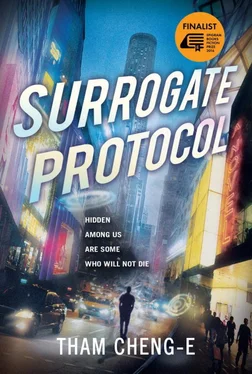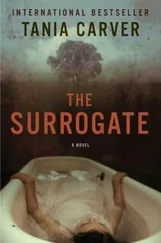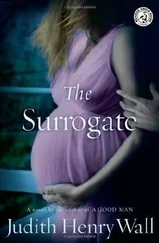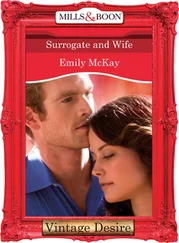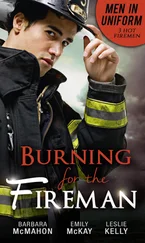Aldred glances over his shoulder. “Could I go see where he lives… sleeps…?”
Pam accedes and leads him past a games room and a diner of multi-coloured tables and peonies before they reach a corridor flanked by rooms of six beds each. Above each bed a ceiling fans spins soundlessly. They enter and Pam directs Aldred to a bed near the window. A tag at the foot of the bed reads “8-C”.
The bed is made, and beside it Aldred finds a nightstand in faux ashwood laminate which contains the resident’s possessions. In a drawer he finds bottles of ointment and packs of unopened catheters and syringes. One compartment holds adult diapers, the one below it carries a heap of old magazines and a rumpled telephone directory from the year 2002. And underneath them all Aldred discovers a rusted tin that still bears traces of the brand of biscuits it once contained.
He lifts its lid to a heap of worthless trinkets—little stringed plastic beads, a brown rubber ball cracked with age, a peeling wooden top and a crinkly cellophane bag containing a few old coins. Deeper into the strata he uncovers a stack of magazine clippings, a faux jade necklace, a few old 70s sticker pads. And in the final stratum—a monochrome photograph of himself seated in an eatery with a young boy perched on his lap. The young boy’s head is thrown pompously upwards, and there is a playful, magnanimous smile on his face.
Life deals its blows. Serendipitous or not, it’s often hard to tell.
The full measure of the recollection hits home like the passing of a heavy, judicial sentence. He runs along the corridor, photograph in hand, his footfalls shattering the calm, his eyes burning; and under the disapproving glares of the attendants he bursts out of the lodge.
On the right he sees a kindergarten down Harding Road, and on the left the road leads off to the hospital block of the former Tanglin Barracks. A football pitch stands in place of the former cricket lawn where he had seen the dead over a century ago. Farther away the road forks and bends uphill along a wooded grove. And there a wheelchair-bound contingent descends in a single file.
He sees him—the old man, four chairs from the front, his head at an angle, his hands upturned like Madonna herself in the likes of Michelangelo’s Pietà , carrying the dead Christ—a Madonna battered by age and whose saliva freely flows from a hanging lip.
Aldred races up to them flushed and wheezing. He scares the attendant to a state of guarded animosity but the old man pays him no attention. Fortunately Pam, who judiciously followed Aldred out of the lodge, catches up with him and, in a string of Tagalog, calms her colleague’s frazzled nerves.
Under the attendants’ supervision Aldred wheels the old man to a wooded grove where they can see the afternoon sun burning red and golden through the trees. He goes over to the front of the wheelchair and crouches so that their eyes can meet. But the old man’s unblinking eyes see nothing; his saliva dribbles on in thin, clear strands onto a blue, sopping handkerchief. Aldred, uncertain of himself, brings his arms around the frail, bony shoulders and pulls the old man into a tentative embrace.
At first the old man does not respond. But as Aldred continues to hold him, his drooping lips twitch, as if in speech, and a seemingly deadened hand lifts slowly and embraces Aldred in return.
Pam and her colleague behold the spectacle from afar, their jaws falling open.
The old man hasn’t lifted a limb for over a decade.
Aldred, now laughing and crying all at once to waves of joy and sadness, plants a kiss on the old man’s head and cradles it gently. “Sorry I’m late, Poppy.” His voice quavers and cracks. “I’ll never leave you again. I promise.”
The long shadows of the dying day stretch over them. They hold each other for as long as it takes to assuage the guilt in Aldred’s heart. All around them branches and leaves stand unmoving, as if in reverence to the wondrous reunion. A tear finally runs down Poppy’s hollowed cheek. And in the brevity of that moment Aldred glimpses eternity.
/ / /
In the backyard of the Botanic Gardens, Evans Hostel sits in the mottled shadows of pines and Senegal mahoganies. Much of its charm consists of its tranquillity, and the tiny street that passes in front of it is empty and quiet most of the time.
A café is tucked into the corner of the hostel’s red-brick façade. Behind its counter Aldred pours a stretch of lustrous milk froth into a tall glass and fills its bottom with espresso. The froth, displaced by the coffee, rises above the rim and keeps its form. He then gives it a light dusting of ground coffee and taps the bell.
“Latte macchiato,” he calls.
The brew heads out to a studious-looking young man snuggling by a corner with his books and headphones. The door swings open and the sound of the outdoors interrupts the air-conditioned quietude inside the café. A woman tries to enter with a stroller but a step at the entrance traps the wheels. Aldred goes to her assistance and sees that the stroller holds a young girl who appears a little too tall for the seat. She has slightly protuberant eyes and wears a beanie over her bulging forehead. An adventure novel sits on her lap. Aldred carries the stroller over the step and she smiles timidly at him.
“Thank you,” says the woman, lowering herself into a velvet couch by the window.
“Can I get you anything?” says Aldred.
The woman looks over a menu board above the counter. “A mocha, please. Just iced, not blended.”
“Anything for the little lady?” Aldred nods at the young girl, who beams at the attention. “We’ve got very good milkshakes.”
“Cranberry juice?” the woman takes her eyes off a chiller at the back. “She doesn’t take lactose very well.”
“Coming right up.”
Aldred returns and places the drinks carefully on coasters and slides the woman a receipt. The woman silently watches his every movement as if in review of his service skills, and just as he is about to leave them she stops him. “Is your name Landon by any chance?”
Aldred’s heart jumps. “Well… yes…”
“I was wondering if we could speak.” She gestures at the empty couch opposite her.
After conferring briefly with his manager Aldred returns to her in a stiff, awkward gait and settles himself carefully into the couch.
The woman sips through a straw and stirs the mocha with it. “It’s delicious.”
“Thank you.”
“I’m Ginn.” Her hand shoots out a second later. “John’s wife.”
Aldred takes it and realises she’s probably every bit as awkward as he is. He is relieved that she did not introduce herself as “John’s widow”.
“This is Fanny, our daughter.”
Aldred acknowledges the young girl with a nod, and in response she bashfully conceals her face behind the novel.
“My name is Aldred now, if you know what I mean.”
Ginn smiles politely. “Doesn’t sound like a common name.”
“It’s an old name,” says Aldred. “My real name… my first.”
Their conversation stalls. Ginn gives another polite smile and averts her eyes. Aldred goes on chewing his lower lip until he decides that it is he who has to break the ice. “I was hoping I could do something for you,” he confesses.
“You have.” Ginn lifts her head, suddenly finding it easier to meet his gaze. “It’s been almost a year and Fanny is responding very well to—whatever you’ve given her.”
Aldred couldn’t help but break into a smile. “I’m so happy to hear that. She’s quite a survivor.”
“Headstrong and a handful. Takes after her father.”
When Aldred turns to Fanny he finds her grinning. “I really appreciate you coming here to tell me this,” he says to Ginn.
Читать дальше
